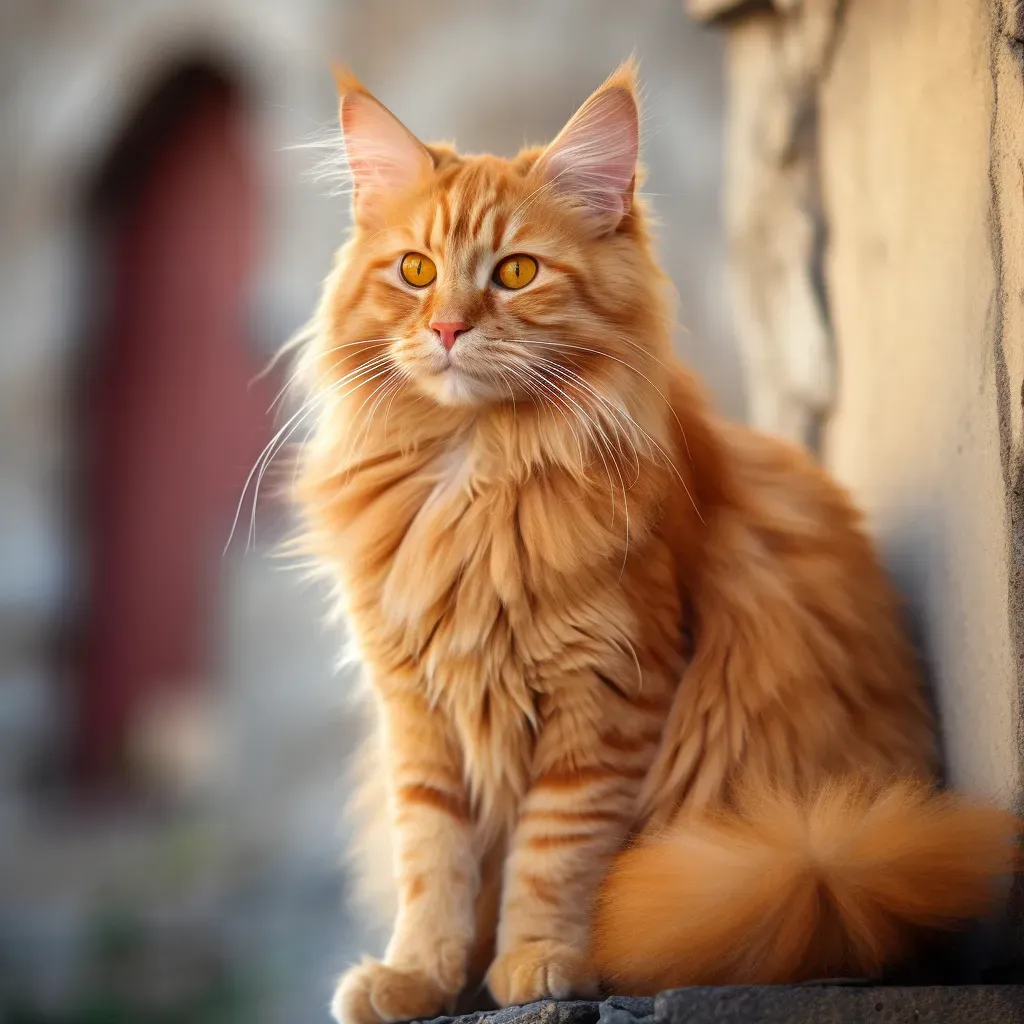When searching for a unique feline companion, the orange Maine Coon cat captures attention with its vibrant ginger hues and majestic presence. Often mistaken for ginger Maine Coons, these striking cats combine luxurious fur, gentle temperaments, and impressive size, making them a top choice for cat lovers. In this detailed guide, we’ll dive into their colors, traits, size, costs, and more to help you decide if an orange Maine Coon is right for your home.
Maine Coons have surged in popularity thanks to their dog-like personalities and over 75 color variations. The orange Maine Coon, officially termed “red” by the Cat Fanciers Association (CFA), stands out for its warm, eye-catching coat. Understanding these classifications ensures you appreciate their diversity and select the perfect match.
Understanding Orange Maine Coon Color Variations
The CFA organizes red Maine Coons, including orange shades, into specific classes for breeding and shows:
- Solid Red Class: These cats feature uniform red fur, matching red tabby criteria, with required white markings on feet, belly, and bib.
- Red Tabby Class: Defined by a red ground color in classic, mackerel, or ticked patterns, ideally with brick-red nose and paw pads.
- Red Tabby and White: Like red tabbies but allowing facial white spots.
- Red and White (Bi-Color): A blend of red and white fur, with white paws mandatory and optional face markings.
Beyond pure red classes, many Maine Coon colors incorporate orange hints, adding to their allure. For instance, the Brown Patched Tabby boasts a coppery brown base with black markings, while Silver Patched Tabby displays shimmering silver patterns. Other variations include Cameo Tabby with red tabby shades, Tortoiseshell with black and red patches, and Shaded Cameo or Smoke classes featuring red tipping over white undercoats. These combos create endless visual appeal, much like unique patterns in breeds such as the chocolate point ragdoll.
Experienced breeders emphasize genetic testing to preserve these traits, drawing from CFA standards for healthy, show-quality lines.
Key Characteristics of Orange Maine Coon Cats
 An orange Maine Coon cat sitting on a stone wall
An orange Maine Coon cat sitting on a stone wall
Orange Maine Coon cats inherit the breed’s signature qualities, blending playfulness with loyalty. As gentle giants, they adapt well to family life, but each individual shines uniquely.
Affectionate and Loyal Companions
These cats crave human interaction, often following owners room-to-room for cuddles. Their loyalty rivals that of dogs, forming deep bonds that last a lifetime.
Gentle and Sociable Nature
Nicknamed “gentle giants,” orange Maine Coons rarely show aggression. They’re patient with children and welcoming to guests, earning praise from veterinarians for their calm demeanor.
Playful Hunters with High Intelligence
Lifelong playfulness keeps them active; expect zoomies and toy chases into adulthood. Their sharp minds allow trick training, like fetch or high-fives. A strong hunting drive means they may gift you “prey”—channel this with interactive toys to prevent boredom.
Water Lovers and Friendly Souls
Uniquely, Maine Coons adore water, splashing in sinks or baths. Males are often bolder with strangers, while females warm up gradually, showcasing their friendly versatility.
They coexist harmoniously with other pets, making them ideal for multi-animal homes. Vets recommend early socialization to enhance these traits.
Comparable to other distinctive felines, their sociable vibe echoes that of the lilac ragdoll, though Maine Coons bring extra size and curiosity.
Orange Maine Coon Size and Growth
As one of the largest domestic breeds, orange Maine Coons impress with their stature. Males grow to 40 inches long, 10-16 inches tall, and 15-25 pounds. Females reach 19-40 inches in length, 8-14 inches high, and 8-12 pounds. Full maturity takes 3-4 years, so gradual growth is normal.
Monitor weight closely—obesity risks hip dysplasia or diabetes. Feed high-protein diets suited for large breeds, per American Veterinary Medical Association (AVMA) guidelines, and provide climbing structures to support their active frame.
Cost of Owning an Orange Maine Coon Cat
Budget for quality when acquiring an orange Maine Coon. Kittens under 9 months cost $1,000 (£819), adults or seniors around $600 (£471). Show or breeding prospects with health screenings reach $2,000 (£1,580).
Ongoing expenses include premium food ($50-100/month), annual vet visits ($200-500), and grooming tools. Spaying/neutering prevents health issues like mammary cancer, as advised by CFA-registered vets.
Where to Find Orange Maine Coon Cats
Prioritize ethical sources for healthy kittens:
Reputable Breeders
Registered breeders via CFA or TICA offer pedigrees, health guarantees, and socialization. Visit multiple litters to observe parents.
Rescues and Shelters
Adopt from shelters—many purebred Maine Coons need homes. Fees are lower ($100-300), supporting rescue efforts.
Online and Pet Shops
Platforms like Facebook or local shops list kittens, but verify with video calls and contracts. Avoid unverified sellers to dodge health risks.
For color enthusiasts, explore variations akin to the colorpoint ragdoll.
The blue sphynx offers a hairless contrast, highlighting diverse cat options.
Health and Care Tips for Orange Maine Coon Cats
To thrive, orange Maine Coons need tailored care. Brush their semi-long coats weekly to reduce shedding and mats. Dental health is crucial—provide chew toys and annual checkups.
Common issues include hypertrophic cardiomyopathy (HCM); screen via echo per vet recommendations. Balanced nutrition with taurine supports heart health. Exercise via puzzle feeders keeps them mentally sharp.
Real-life experience from Maine Coon owners: Interactive play prevents destructive behavior, while elevated water bowls satisfy their aquatic fascination.
Conclusion
The orange Maine Coon cat embodies elegance, intelligence, and warmth, perfect for dedicated owners. From CFA color classes to their gentle, playful spirits, these felines offer unmatched companionship. Choose reputable sources, prioritize health screenings, and commit to their long 12-15 year lifespan for joyful years ahead. Consult a veterinarian for personalized advice, and explore more breed insights on our site.
References
- Cat Fanciers’ Association (CFA): Maine Coon Breed Standards (cfa.org)
- American Veterinary Medical Association (AVMA): Feline Nutrition Guidelines (avma.org)
